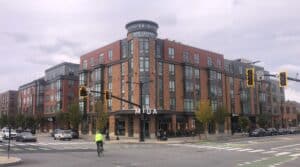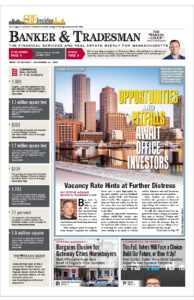
Multifamily developments up to 71 feet would be allowed by-right in eight Newton neighborhoods under city officials’ proposal to comply with the MBTA Communities law. Photo by Steve Adams | Banker & Tradesman Staff
Perched at a gateway intersection to the Newtonville neighborhood, Mark Development’s Trio apartment block is a Rorschach test for competing visions of Newton’s future.
Replacing a block of low-rise commercial buildings that housed a Mediterranean restaurant, camera store and ballet school, the 140-unit apartment complex which opened in 2020 is an example of the scale of multifamily projects that would be permitted under the Garden City’s proposed village center overlay zoning.
Supporters say the infusion of residents populating such new developments would benefit Newton’s commercial districts, while boosting housing production in one of Massachusetts’ least affordable communities.
“Merchants will do better if we’ve got more foot traffic, more vitality, and more people living within walking distance,” said Robert Gifford, a member of Voters for a Vibrant Newton, a group which supports the village center overlay.
Opponents have a gloomier outlook for neighborhood businesses, predicting disruption during redevelopment. They foresee departures of local institutions in favor of bank branches and chain restaurants in sterile new projects that overwhelm neighborhoods with congestion.
“We hear about how it’s going to help businesses,” Nonantum resident Albert Cecchinelli said at a public hearing this month. “It’s not. From the time the building in the village centers is torn down until the time the new building is ready for occupancy, they will have had no revenue.”
Proposal Exceeds State Minimums
Under the 2021 MBTA Communities law designed to stimulate transit-oriented multifamily development, Newton faces a Dec. 31 deadline to rezone areas within a half-mile of MBTA stations for at least 15 housing units per acre.
The city’s Planning and Development Department went beyond the minimum requirements of the MBTA law, proposing to upzone a total of 13 village centers, including neighborhoods such Upper and Lower Falls that don’t have MBTA stations.
Under the current proposal, which was slightly scaled back in September, the rezoning applies to a total of 1,264 parcels citywide, down from the previous 1,464.
The highest density would be permitted in parts of Auburndale, West Newton, Newtonville, Newton Corner, Newton Centre, Newton Highlands and two small sections off Route 9, all of which would qualify for the maximum 71-foot building heights. Other sections near the village centers would be approved for 58- and 40-foot building heights.
A vote on the rezoning is expected before the Nov. 7 municipal election, and proponents are confident they have a majority of support, said Greg Reibman, CEO of rezoing backer the Charles River Regional Chamber. But foes have indicated they will file papers to require a referendum to repeal the approval.
Nonantum Says No to Changes
The public backlash has been strongest in Nonantum, one of Newton’s denser neighborhoods near the Watertown line where many residents measure their connections to the area in generations.
At a hearing sponsored by the Newton City Council this month, neighborhood residents predicted new developments will displace families and locally owned businesses, while overwhelming the neighborhood with years of disruptive construction and permanent congestion. They criticized the elimination of parking requirements, in a neighborhood where residents compete for on-street spaces.
Reibman said the villages’ future economic stability can’t be taken for granted.

Steve Adams
“I worry about some of these mom-and-pop businesses that are in the single-story buildings and have been there for decades being displaced, now that there is an incentive to build taller,” Reibman said. “You have to balance that with the fact that our villages are suffering from a lack of foot traffic and vitality.”
Developers such as Wellesley-based Mark Development would have found a more direct path to approval under the new zoning, compared with the year-long special permit process that was needed to secure approval for the Trio project in Newtonville.
Mark Development CEO Robert Korff selected a mix of local and corporate tenants for the commercial space in the Trio project. The Shoe Barn, a West Newton mainstay, took one of the storefronts as it relocated from a Dunstan Road property acquired by Mark Development for another multifamily project. Mida, an Italian restaurant by local chef Douglass Williams, opened in another ground-floor space. CVS and a Chase Bank branch occupied other storefronts.
City officials estimate the rezoning would clear the way for approximately 8,300 new housing units, subject to developers acquiring properties and receiving finance to build projects.
Jason Korb, a Newton resident and developer who specializes in small- and mid-sized multifamily projects around Greater Boston, said the pace of change will fluctuate based upon market conditions.
“Just because you’re zoning for it doesn’t mean it’s going to be built out to every single unit,” said Korb, principal at Capstone Communities. “Developers still need to get financing and make the deals happen.”





